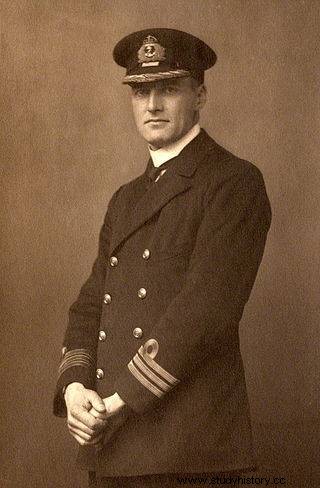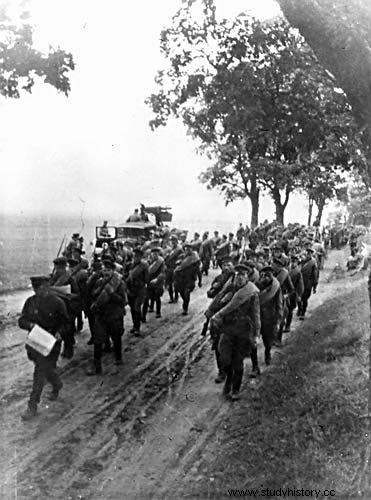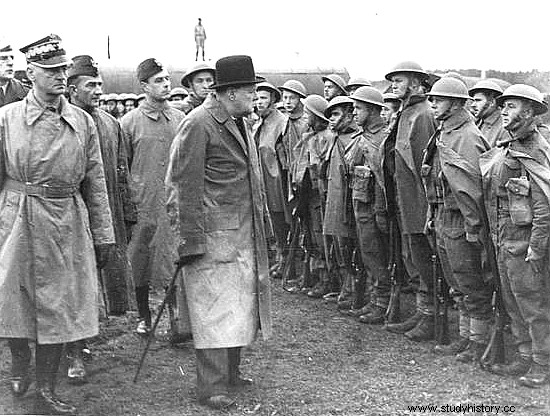The British and French delegation spent over ten days in Moscow in August 1939. It is uncertain what its purpose was actually - to avert war, or maybe to give it a shape that was ... convenient for London?
"The military conference ended in a fiasco because Poland and Romania did not agree to the passage of Soviet troops through their territory," wrote Winston Churchill about the August talks of the two delegations of Western powers in the Soviet Union. It was true - but, as is often the case with politicians' statements, not all. The British bear great responsibility for the failure of the Moscow talks.
At the beginning of August, of course, Berlin was already making advanced efforts to reach an agreement with the Kremlin. Still, it seemed that the Soviet Union would rather get along with the old powers than with the fascists, who were so ideologically hostile to the communists. There was, of course, no love between London and Paris and Moscow, but there was an understanding of the seriousness of the situation in Europe. Of course, whether this seriousness was understood as a threat or an opportunity is another matter.
On board an old steamer
Whether a coalition modeled on the one in 1914 was to be established was to be discussed by the military of the three countries in Moscow. It was 1939, and relatively fast means of communication already existed. And yet delegates from Great Britain and France went for interviews ... on an old passenger steamer. The journey took them almost ten days - they arrived in Moscow on August 12.
It seemed that, at least for this time, both delegations would be able to prepare themselves thoroughly for the talks. Nothing could be more wrong. While the French, General Joseph Doumenc, had at least the power of attorney to the French Prime Minister, his British counterpart Reginald Plunkett-Ernle-Erle-Drax, then an already retired admiral, a man probably noble and full of good will, but completely detached from the matters entrusted to him, he was not endowed with any serious powers of attorney.

Reginald Plunkett-Ernle-Erle-Drax in 1918
The low rank of the British delegation was a clear signal of the importance that His Majesty's government attached to the talks in Moscow.
So when the retired Admiral Drax told the French that there was actually no point in talking to him, they were very surprised, but when he repeated the same to his partners in Moscow, chaired by Marshal Klimient Voroshilov, they were already very irritated. Nevertheless, the role of the French delegation was also primarily to delay the negotiations and not to make binding decisions.
The subject of the talks was the threat to Poland and Romania from Nazi Germany - although no Poles or Romanians were invited to the table.
The British and the French, as they had declared it before, were ready to help Poland - but the form of this help was quite enigmatic, which, unfortunately, the government in Warsaw did not want to be aware of. Only land forces that would have stopped the Wehrmacht could defend Poland.
Marshal Voroshilov asked his interlocutors whether the Soviet troops would be able to operate in the territories of Poland and Romania in order to fight the troops of the Third Reich. Representatives of London and Paris avoided the answer, sending them to Warsaw and Bucharest for it. Voroshilov insisted - he claimed that both Western powers, since they had allied with the Poles, should be able to answer this question. It was decided to wait for instructions. These, however, did not come for a long time.
Confusion reigned over the Thames and the Seine. Probably it was expected that the mere fact of the talks, followed by the announcement of the alliance, would scare Hitler away . The idea that the Soviet Union would logistically support Poland did not seem bad either. But the idea for the Red Army to operate on Polish territory was a surprise.
Ask Poland on her knees?
While the French still wanted to convince Warsaw, the British behaved completely passively. The head of Polish diplomacy, Józef Beck, flatly refused to allow the Red Army to march through Polish territory. He knew that when this army entered, it would not come out. Historian prof. Henryk Batowski wrote:
Counting on the immediate and effective help of the Western allies from the first day of the war, and overestimating their own defense capabilities, the Polish high command and the Polish Ministry of Foreign Affairs believed that the German aggression could be stopped also without military aid of the USSR.
Paris, however, put pressure on Warsaw. The head of Polish diplomacy did not hide his indignation that Moscow's position was communicated to him through and not directly. Eventually, Józef Beck, expressed his possible readiness to cooperate with Moscow, if it would help in a joint action against the aggressor . However, he insisted on his opposition to the admission of the Red Army to the territory of the Second Polish Republic.

Red Army units during the aggression against Poland
“Soviet diplomacy took up a skillful game on both sides. Everything was subordinated to the assumption "who will give more?" Germany or Western powers, write Beck's biographers, Marek Kornat and Mariusz Wołos. Of course, Hitler made more promises - the Baltic states, among others. The French, however, pressed for an agreement with Moscow, and the British behaved completely passively. Either way, each declaration required further consultations - either with the governments in London and Paris, or talks with the Poles. It went on forever.
Finally, on August 23, Marshal Voroshilov announced to his guests that there was no longer anything to talk about. The head of German diplomacy Joachim Ribbentrop was already in Moscow with a ready-made pact proposal and any powers of attorney. His trip to Moscow took much less time than that of the elderly Admiral Drax. He just got on the plane. The German-Soviet alliance has become a fact. Voroshilov told his guests:
Throughout our negotiations, the press and Polish society constantly stated that they did not want help from the USSR, and there was no answer at all from Romania. Were we to conquer Poland first in order to be able to offer her our help, or ask her on our knees to accept this help from us? The situation was unacceptable to us.
The French were concerned about the failure of the talks, but the British were less so.
To London by plane
Warsaw was rightly afraid of the entry of the Red Army into Polish territory, but the obstructive attitude of the British did not stem from concern for the territorial integrity of the Second Polish Republic. In London, maybe Poland was not so much disliked as it was simply considered a problematic, adventurous state especially after the occupation, alongside Hitler, Zaolzie, and anti-Semitic.
Above all, 10 Downing Street was driven by its own, i.e. British, interest. There was, of course, a war with the Third Reich, but rather a defensive one, or only later. Therefore, they wanted Warsaw to stand up to Hitler and not come to an understanding with him. Fighting or conquered Poland would bind significant German forces anyway. It was logical and fully justified from London's point of view.
It is known how the story unfolded. Germany attacked Poland on September 1, 1939, and the Red Army on September 17 and so entered its territory, seizing huge areas in the east, without asking Poles for consent. At the same time, as Józef Beck's biographers write:"there is probably no Polish historian at present who would say that consent to the entry of the Red Army into Polish territory would be an effective rescue from a catastrophe, which would become a part of the Second Polish Republic in September 1939 ”.

Winston Churchill, then a political outsider but soon the prime minister, said what he thought about all of this. He stated that "it would be better if the Russian armies stood on the present line as friends and allies of Poland, and not as invaders."
The only question is whether if British diplomats had played a more active role, or had they treated Poles subjectively while speaking in Moscow, the war would have broken out on September 1? We don't know that. Once the "milk was spilled," Winston Churchill, then a political outsider, but soon the prime minister, said what he thought about it all. He stated that "it would be better if the Russian armies stood on the present line as friends and allies of Poland, and not as invaders" .
British author Peter Hitchens noted, however, that the eventual defeat of Poland and the occupation of its eastern territories by the Soviet Union were perhaps not such a misfortune in the eyes of the British establishment, including Churchill. “The Soviet troops are now much closer to Berlin than before the outbreak of the war. Thus emerged from the darkness the outline of a future agreement with Stalin, "writes Hitchens.
When, after the signing of the Ribbentrop-Molotov Pact on August 23, the Soviet Marshal Voroshilov informed his British and French interlocutors that in the face of a dramatic change in the situation in Europe, their further talks did not make sense, they gathered home.
Retired Admiral Reginald Plunkett-Ernle-Erle-Drax this time decided to make the journey much faster - through Scandinavia and then by plane to London. Does he have a feeling of a well-fulfilled duty?
